#more parallel scenes 0-0
Text
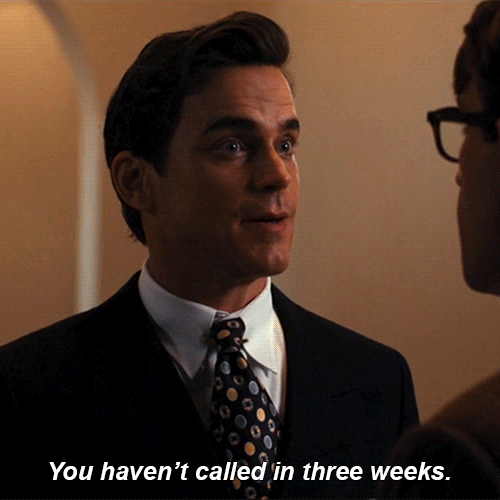
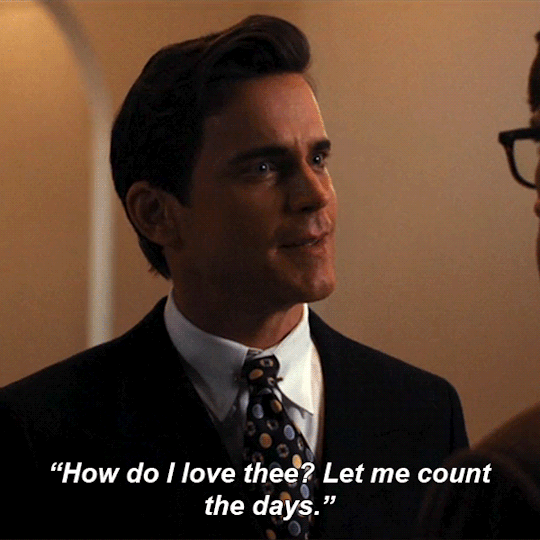
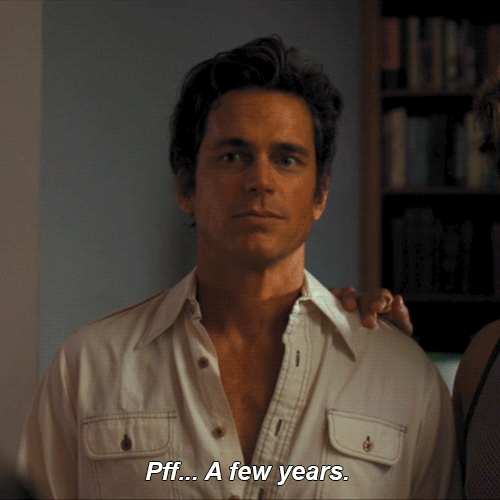

Fellow Travelers - 1.03 vs 1.07
#more parallel scenes 0-0#fellow travelers#also sorry if someones already done this in the last day or two -#i'm lowkey avoided the ft tag rn cuz all the ep8 spoilers 😭#tim laughlin#hawkins fuller#my gifs#these aren't my best work but thats okay 👍
378 notes
·
View notes
Text
Can't fucking express how much I love makoto ;-;
I really liked kiwami 2s closure scenes for majima and makoto
#yakuza kiwami 2#lb#idk what it is but. ok obviously yakuza 0 ans the kiwami 2 majima story asded later than original 2#but makoto/majimas synamic is SO well written. so well done in scenes#they WORK they parallel they have emotional weight which tracks right for both ans hurts#my heart in a good way#kaoru_kiryu in kiwami 2? better than i Expected (as i actually rhink kaoru was fairly consistently written and#the romance was fine. logical for both tho not necessarily needed. short lived as well whixh is in character. it#was at least more time given to kaoru then yumi in 1 which was a weak point#but like. kaoru was Meant to parallel kiryu but just. doesnt as much. partly cause they both isolate and self#destruct so easily.#whereas idk majima and makoto were stuck together by necessity so had more time to show off their parallels?#also kiryus just nore of a loner. idk it just didnt hit me emotionally as much. altho i do think i felt kaoru was fairly consistent and i#liked her. and understood kiryus actions.#but yeah like. makoto and majima? idk that just workwd for me a LOT#maybe cause i relate to them both. and its realistic!!!#its realistic to never confess u love someone when u were in crises then drift apart. but still#want to know if they ended up okay and say thank you. then let go. thays like a REAL thing ive gone thru and know ppl#who went thru. so yeah i cried. and i get why they cried.#but like kissing rught before a bomb goes off lol? im probablt never doiny that
4 notes
·
View notes
Text
this is going to be my somewhat-brief analysis (buckle in, it's not brief at all) of preluding scenes to farleigh and olivers... scene, lmao. because i can't read micro-expressions and social cues IRL, but i can for movies! also, i want to give my understanding of farleigh's character using the most substantial part of his arc. i disagree so much with a lot of people's takes on farleigh. i needed to talk extensively about it.
[0:58:46] farleigh makes eye contact with a footman. this is one of the footmen that farleigh mentions to felix in a later scene, which i'll also go into. what's interesting about this subtle interaction is how wildly differently you could consider it, depending on how you choose to view farleigh as a character. if you go the "mirror of oliver," route, then this eye contact could be the moment farleigh decides the route he's going to take to confront felix.
on the other hand, the hand that i believe makes more sense, farleigh is genuine in his confrontation with felix. the eye contact he shares with the footman is reciprocated; the footman holds it, even as his body pulls back and his head turns. this gives the idea that they are making a connection. the expression farleigh makes afterwards is also an indication that farleigh isn't plotting or scheming to earn pity points; he feels a connection and comradery with the only other black people at saltburn. when the footman turns away, unneeded anymore (this can be a parallel to farleigh), farleigh glances down, back up, then purses his lips. he looks dejected, in my opinion. this is immediately followed by farleigh's dig at oliver; "i think oliver looks like he'd rather throw himself out of a window.
food for thought.
[0:59:9] elsbeth: you can invite all your friends. farleigh: what friends?
this can obviously be a petty dig. and it is, in some ways. but i think a lot of these petty digs are because farleigh has been here before. he has watched his cousin drag home mediocre and tragic (presumably) white boys for perceived self-benefit. whether felix wants entertainment, wants to quell his guilty conscious (both of which are motivations for his mother), felix seems to have these fleeting possessive relationships with the friends he brings back to saltburn. he could also be queer and deeply repressed, lmfao.
i digress; farleigh is sick and tired. the first thing he says to oliver, before oliver even got to felix, was bitchy as all hell. after that, farleigh had more incentive to belittle oliver; yes, his comments about mannerisms, class, and overall character were petty. they were also all of the qualities that farleigh couldn't afford to have. farleigh is pointing out that oliver has no social life, yet still gets a 200-person party full of people that don't even know his name. this is tragically unfair, at least in farleigh's mind.
[1:01:25] felix: and fucking farleigh, what a little shit stirrer. oliver: well, someone has to entertain us all. felix: ...right. oliver: that's why we love him.
there's a clear disregard of humanity and depth, when felix concedes that farleigh is "entertainment." the sheer fact that felix would immediately believe oliver, a "stranger (as venetia so eloquently puts)" over a close family member, is odd on it's own. there are probably more reasons for distrust; everyone in saltburn is a shit stirrer, and farleigh does put on a particularly good show.
that's intentional, though. farleigh is very intentionally entertainment. otherwise, why would the cattons keep him around? they're welcoming people to their house as family, because they want a break from the reality of soul sucking wealth. because they want entertainment. elsbeth with her friend, who's only real personality traits are being pitiful and visibly different. felix, with his summer pet projects like oliver. farleigh can't be a temporary show; he needs to keep coming back. he needs sir james to support his mother.
[1:02:40] farleigh: i'm not saying my mother isn't completely idiotic when it comes to money. felix: you just have to be firm with her. farleigh: well i can't call her and tell her no! felix: i know, i know, you've said that. i know, i understand. farleigh: no, you don't know! you don't, it's humiliating. felix: it's very hard.
felix's approach to discussing other people's issues--that he does not relate to--makes me giggle sometimes. not that he's malicious or a fumbling idiot, but because of this scene specifically. in just this chunk of dialogue, you have the "i understand" and "you don't understand" conflict. an age old one. a common representation of someone who has never lived a specific struggle yet frames themselves as knowledgeable. felix seems to enjoy the "it's very hard" verbiage. the manner in which he speaks to oliver about his supposed impoverishment and struggles is very similar to the way he speaks to farleigh, in this scene.
i don't know what else to say about this. you can make your own inferences on felix's dialogue, i suppose.
[1:02:50] farleigh: i'm sorry, but it's a bit fucking shitty. you're all throwing oliver a party for 200 people while my mother lives in squalor. felix: well, she's hardly living in squalor, mate. farleigh: well she can't pay her bills so she will be! okay? at the rate she's going, she will be.
GAH. again, this dialogue can be considered in two different ways. farleigh could be hyperbolizing in order to play into the catton savior complex. or he could be completely genuine in his anxiety surrounding his mother's finances. it's very important that you recognize the fact that farleigh isn't arguing about himself, in this situation. he's talking about his mother. later in the conversation, he recenters himself as a person of color. but the original conflict is about whether or not his mom is living comfortably. this arguably affects him, but not entirely. he could continue to maintain his oxford-student-and-saltburn-resident character and continue to frolic around while his mom struggles to make responsible decisions.
[1:03:02] felix: right, well that's exactly why dads concerned about helping her. he doesn't want to enable her. he wants her to learn how to stand on her own two feet. farleigh: yeah, like he does?
and farleigh ate.
[1:03:09] farleigh: i mean, you know how this looks, right? making me come to you with a begging bowl. felix: what are you implying? farleigh: i think you know what i'm implying, felix. why don't you ask liam and joshua? felix: who... who the fuck are liam and joshua!? farleigh: ...your footmen.
farleigh's mannerisms in this portion of the scene GAG me. the easy confidence, the self-assured and confrontational attitude. the cocky wave of his shoulders and tilt of his head. he smirks, scoffs, makes and holds eye contact as emphasis to what he is accusing. the way he says "i think you know what i'm implying" even though i'm not quite sure if felix did. this really hammers in the implicit nature of the cattons' treatment of farleigh.
[1:03:33] felix: oh, oh. that is... that is low, farleigh. farleigh: okay. felix: jesus christ, mate! seriously, is that where you wanna take this!? farleigh: right. felix: make it a race thing!? what the fuck! i mean, we're your family, we hardly even notice that you're... different, or anything like that! farleigh: mmm. felix: i never know our footmen's names!
GAGGED. i eat up this scene and lick my fingers. "wohohoho, i don't see color! i can't believe you'd make it a race thing!" i know i should cut felix some slack, but this is just a little too real. although i've cut farleigh some slack for his classism.
the complete change in farleigh's mannerisms from the previous timestamp to this one is EDIBLE. i can't cope with it. his smile as felix says "that is low" is so painfully real. it says "i've been here before and maybe i was expecting this." for a second, felix is almost entertainingly cliche. then the exasperation hits. farleigh just looks tired. he blinks rapidly, smooths over his eyebrow with his hand, vocalizes his disbelief in felix's denial. "we hardly even notice you're different," to which farleigh crosses his arms (defensive), raises his eyebrows, nods along.
i won't include the final few lines of this conversation cuz i'm blabbing FAR too much, but farleigh's expressions of absolutely exhaustion and disappointment as felix says they've "been more generous then most"... i'm so sick. it doesn't matter what other families would do, because this family passes out charity like it's their favorite pastime. farleigh is your best american girl.
oliver, overhearing this conversation, immediately knows what his next plan of action is. compare himself to farleigh. and really, it's funny, because oliver misses the obvious differences between him and farleigh. just like everyone else. he will never feel different, not in the same way farleigh does. not with farleigh's relationship to the cattons, the legacy of his parents, and his blackness.
[1:06:32] (godfather's karaoke scene, AKA apple bottom jeans. he's a disgusting manchild and he throws his jacket at his wife.) is it odd to point out that another one of the only visible black characters is being degraded/mistreated/disregarded? not crazy, right? especially following the conversation about bias two scenes ago.
[1:07:02] farleigh: y'know, i think i'd fuck richard the III. he's so insecure, so you'd know he'd put in the work, right? oliver: or you could just fuck me, right?
here, i think there's a level of projection that farleigh is using in his line about insecurity. not only is it made known that farleigh uses sex as a tool (with teachers, specifically), but it's also made known that farleigh believes/knows that he is treated differently due to his race and/or family history. oliver seems to have clocked this, considering he relates himself to richard the III, then tells farleigh they have similar experiences.
[1:07:34] oliver: y'know, if you ever wanna talk to anyone, you can talk to me, farleigh. farleigh: ...what do you mean? oliver: well, i know you're going through a hard time at home. i know how that feels, when things are so precarious. it's terrifying... and lonely. and it must be so fucking weird, having to ask them for everything. and i know you fucking hate me. farleigh: i... i don't hate you. oliver: but... if you ever wanted me to talk to them, to see if there's... if i can help in any way... just ask. farleigh: ...okay.
i love this movie. have i said that yet? i bet you definitely couldn't tell by this post. this conversation is so... there's so much to talk about.
i'll start with some of my favorite of farleigh's mannerisms/expressions. when oliver first cuts their... tensions with "you can talk to me," farleigh pulls back slightly, sits up slightly, looks across oliver's face. there's a level of shock to it, but. farleigh was comfortable with oliver, his sworn enemy, flirting with him. yet, he pulled back at a genuine offer of support. some see this as farleigh always wanting oliver sexually, but i think it's more nuanced than that. when oliver says "terrifying... and lonely" that's when the camera cuts back to farleigh. he previously wore a half-smile that is now dropping; "lonely" was the hardest word to swallow. his lip is quivering. he looks up in an almost-eye roll when he says, "i don't hate you." he's laughing when oliver finishes, like he finds it all funny, yet the way he says "okay" makes him seem genuine. however... clearly not, considering the next portion of this scene!
even though oliver is lying out of his ass, everything he's saying is a description of farleigh. people grossly misunderstand farleigh's character, even when it's laid onto a banquette sized table through this portion of the movie. he's insecure, desperate, terrified, unsure, and lonely. farleigh, with so many friends and so many scandalous choices, is so fucking lonely. he knows he doesn't belong here, so he jams his ill-fitting puzzle piece into the saltburn jigsaw and crosses his fingers.
he tells oliver he doesn't hate him, and he looks like he's struggling to spit it out. he looks up towards the ceiling, closes his eyes like he's gathering himself. again, people take this as a bonding moment. the next portion of the scene contradicts this. honestly, i'm not completely sure, either. i think he's honest when he says he doesn't hate oliver. so, what? he's jealous, definitely. he wants to hold the same power as oliver, a foreign entity with somehow so much more privilege than farleigh. maybe that bred a certain kind of infatuation; the need to emulate what you'll never be. of course, he sees himself in the boys felix brings home; they, just like farleigh, need or want something from the cattons (although i object to the idea that farleigh is somehow "a mirror" of oliver). do what you will with this word vomit, i don't know where i'm going here.
and OH MY GOD "if you ever wanted me to talk to them, to see if there's... if i can help in any way," is diabolical. so terribly diabolical. the sheer idea that oliver knows, is pummeling it into farleigh's face, that he has authority over farleigh's life like that? that he knew felix for six months and he can somehow "talk to" farleigh's family about treating farleigh better... vomit inducing. farleigh is actually your best american girl.
[1:09:39] (karaoke scene) elsbeth, so uncomfortable with the idea that oliver is using them. i suppose that's the manner of wealthy people; they don't want to believe that they're only good for their money. but... they did that to themselves, in a way. they enjoy the pet projects, the charity work, the ego boost that comes with inviting the "lesser" to saltburn. hanjob on a haybale, golden big boy summer, right? everyone in the room is scandalized. farleigh is having the time of his fucking life. yet, here's the kicker,
[1:10:10] oliver: this is your song too, farleigh. come finish it. farleigh: only if you insist!
and then farleigh gives the performance of his life, by the way. people died. but... nobody is uncomfortable. literally no one. no one shudders or gasps at the scandal of oliver saying "this is your song, too" over the karaoke microphone; everyone heard. nobody cares. they all know. they start clapping farleigh on, cheering. elsbeth relaxes back onto her bed of cushions, because farleigh is entertaining. the change in mood is soooo... interesting.
[1:10:45] curse this scene, i don't even want to talk about it. it was hot, oliver and farleigh are so homoerotic, whatever yadayada. just like every other sexual scene in this movie, it is riddled with a suffocating kind of uncomfortable tension. we are made intimate third-party witnesses to carnal, sinful, emotionally ambiguous scenes. when i pointed out farleigh seemed more comfortable with flirting then comfort, when i said farleigh uses sex as a tool, when i said farleigh was projecting with "he's so insecure, so you know he'd put in the work." i just overthink. but any person that has sexual relationships with teachers needs intensive therapy and that cannot be denied. however, it's oliver, that uses sex as a tool throughout this movie. another uncomfortable parallel between the two characters.
something about farleigh's expression throughout this scene is... kind of hurtful. the way the moonlight just barely illuminates the light in his eyes, whereas any detail of oliver's face is shrouded in darkness. it make's farleigh look young, innocent, real. (sidenote, as i'm watching, i have to mention this. the way farleigh says that second "no" is so funny. "...no...?" LMFAO). man, i don't even know what to say, past this. the whole dominant dynamic, farleigh saying "i'm going to behave" is a little too painful considering the context leading up to this scene. it's freaky. it's so very oliver.
this is way too long but i could make so many more connections with their final confrontation at oliver's birthday party. i'm drowning in thoughts. what i really wanted to highlight was how ambiguous farleigh's character is, and how differently a lot of his scenes can be perceived. i've decided that farleigh is a sympathetic character, similar to oliver but so much less powerful. some people hate farleigh! so. there's that. the end! thanks to anyone who read this whole thing!
#farleigh start#again... i love him#he's my king#my mitski#my roman empire#he's a little too real#saltburn#oliver quick#aaand i hate that guy#felix catton#he's on thin ice#i didn't mention venetia at all#my bad#she wasn't really doing much in this portion of the movie#am i insane?#was this a crazy thing to write#someone should validate me#farleigh help help help#farleigh? that guy#farleigh catton#which isn't his name but whatever#saltburnnnnnnnnnn#saltburn 2023#you're the sun#you've never seen the night#but you hear its song from the morning birds#well#i'm not the moon#i'm not even a star#but awake at night
187 notes
·
View notes
Text
taking some extra anatomy classes this year, here are some of my notes in case they could help someone. should be updated every weekend (aside from october 28th and november 4th which are free days) with the following lesson's notes. (further explanations at the end)
anyway. here goes:
SCENE 0-1: LEARNING HOW TO LOOK/OBSERVE
when drawing, we each more or less have our own methods when approaching certain subjects, with multiple tools at our disposal in order to achieve the desired results.
but generally, when drawing a model (or most things from life, actually) we can in some sort of way define a general order as to when to draw what:
Looking / Observing
Blocking In
Correcting
Details
for today i’ll focus on the first one of the list, looking / observing.
the existing nuance between “seeing” and “looking” exists in the sense that “seeing” is more passive than “looking”. when you say “i can see a cat”, you aren’t paying too much attention to the cat. but when you say “i am looking at a cat’, you are actively paying attention to the cat and what they’re doing.
(given the class is in French, the nuance was similar, using the words “voir” and “regarder”. but due to French not having a close equivalent to “watch” i cannot make more parallels about this, as my knowledge of English and French-to-English translation is still fairly limited)
when looking at a subject, the primary objective should be to understand what you’re looking at. you can look at a subject (or the world as a whole) under multiple filters: values, hues, proportions, in 2D or 3D, and so on. you need to define how you want to look at a subject following these filters of vision. what do you want to look at first? what do you want the viewer to look at first? this is important to define before you put your tool to your support.
generally when drawing from life, it’s a bit reckless to rush to draw the model without actually observing them a minimum. you should take the time to observe, you are allowed to take your time to observe. no amount of limited time should paralyze you from examining the model the best you can before you put your tool to use.
getting this more precise vision of your model can give you a better vision of their body, which is often hidden under detail. when drawing them, you should ask yourself “how is the model posing?”
why look/observe? (probably like the most given piece of advice by pros and art youtubers who aren’t pros but still get called pros cause they have 1 million subscribers on youtube)
this question is very easily asked but also very easily answered:
to know how and what you’re going to draw
to time yourself correctly and have a good time management (drawing a pose in 2 minutes is completely different to drawing a 10 minutes one), thus,
to avoid rushing to draw the subject. as said previously, take your time. start slow, but stay accurate to the model. (teacher compared it to a musician rehearsing a piece, first slowly, then speeding it up progressively as he gets to know the piece itself better and better. unfortunately as someone who is as farthest from a musician as can be, i cannot honestly attest to if this is accurate).
but really, there is actually no such thing as a “finished” drawing. a graphite drawing could always have color added afterwards, a painting could always get more and more detailed. a piece is “finished” only when you deem it is finished. the French Académie des Beaux Arts didn’t like the Impressionists because to them, what the impressionists were doing were half assed jobs, since the idea of “transmitting a vague feeling, or an emotion through a specific style of very visible strokes” was absolute fuckery to them. speaking of,
to transmit an emotion, or a feeling through the posing of the model. the more technical and controlled the strokes will be, the finer the wanted sensation will be felt by the viewer. this also ties in the physical aspect of the model. ideally, in order to achieve this, you can try posing the same way the model does. it may be a bit awkward but it works (depending on your learning type, of course.)
to understand how the whole “body system” works. “i know the rules of the human body, therefore i make little to no mistakes.”
adding a whole context to the pose helps: adding a situation in which the pose could work in gives some meaning to your drawing, as well as helping you remember it better. it also adds a narrative element to your drawing(s), which are absolutely always a plus. (memorization is also an important tool!)
now let me play devil’s advocate and ask: why not look/observe?
well, uh, there are two reasons my teach told us:
to let your instinct and imagination go wild and free, trust your gut and have fun!!
and, tying back,
to let yourself be surprised by what you’ve done.
form synthesis (or just different types of approaches to draw form)
when drawing a model, there’s a few things that can be mentioned:
multiple types of lines exist with different purposes within the drawing: the action line(s), structural lines, and contour lines.
action lines define the overall movement of the pose. the principal one is the one you see when giving a better look at how dynamic the pose is. the secondary ones are the ones you can find in secondary rhythms when examining the pose a little longer.

(here's a better example, actually:)
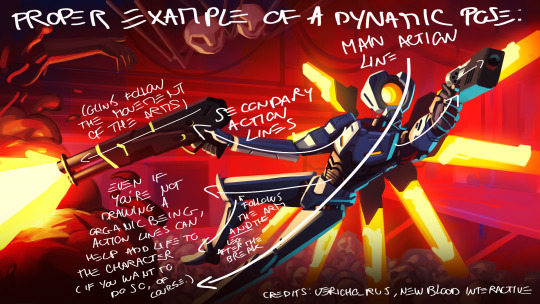
structural lines are pretty much the “stickman skeleton” you sometimes see in certain how to draw books (specifically the more advanced manga themed ones).

contour lines surround the form in a way as to draw all of the outer body without using inside shapes or lines. (it is also the basis for the Bargue method which will be slightly discussed below. there unfortunately won’t be any talk about cross-contour lines, as it hasn’t been talked about in class (yet?))
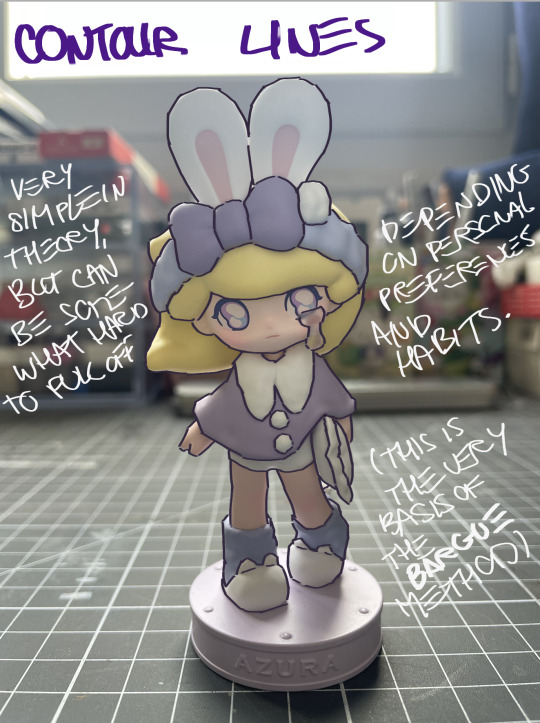
generally, lines take either an I shape, a C shape or an S shape. (teach said it’s preferable to mostly use I and C type lines when drawing live models. probably due to the fact that S shapes are much trickier to use “effectively” within a piece (effectively not meaning much in this context, if nothing at all. again, have fun.)). using these lines tell a lot about the model and the pose, telling a sort of dynamic storytelling which varies depending on what type of line you choose to represent your model.
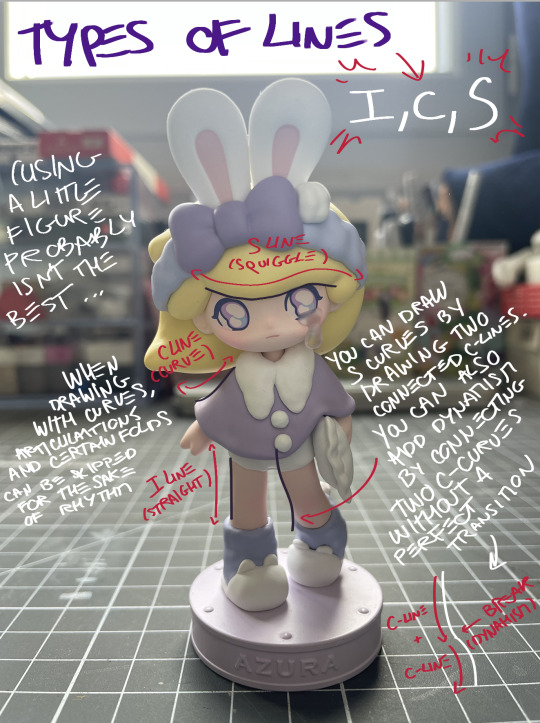
we can mostly talk about 2D shapes when three or more points have been linked by lines. sometimes, lines can skip articulations for the sake of dynamism. shapes should be thought about in their entirety, the difficulty that can be encountered usually being remaining vague but accurate with your form.
now, a quick word about:
the Bargue method (or, the fuck do you mean the Americans used it in art schools before us, Bargue was literally born in Paris, i fucking hate the Académie des Beaux-Arts)
the Bargue method is probably fairly well known among certain art schools or artistic communities. if i do recall correctly; it originated with Bargue noticing the low level of the students of the Académie des Beaux-Arts de Paris (or some other place basing itself solely on academic style art and paintings located in the city of Paris in the country of France on the continent of Europe) and devising a simple way to learn how to draw accurately from life (or plaster casts, depending on what you prefer). it solely based itself on straight, contour lines, forming a base around which to slowly add details to. apparently, a lot of art schools in america base their teaching of life drawing on this method, but given i do not feel like getting over $200k in debt without even mentioning living and travel costs, i cannot say if that is actually true.
here's an example of it:

it’s pretty much basing yourself on simplifications of the form to attain absolute accuracy. no curves here to distract you, only straights. somehow, when pulled off correctly, it gives a very neat impression of realism.
anyway, that’s all i wrote down. hope teach won’t see this anytime soon, and hope this kinda helped a little bit. next week’s notes should be about blocking in shapes, so we’re starting to be a little more concrete with the actual drawing process.
these classes were taught by Mr Francis Buchet at a class given at the Académie de la Grande Chaumière, so most of the things i’m saying here are taken from him and his class. if you live in/close to Paris and are interested in learning artistic anatomy, i suggest you look up where he is giving public classes, since they’re infinitely more engaging than these notes. his instagram is be linked below. (hoping he doesn’t get mad at me for sharing these notes… in any case i will use my own example sheets to avoid getting in any more trouble.)
and, may i remind you: these notes are only here to showcase one approach among many others, so they don’t mean much in the grand scheme of things. i myself am in absolutely no way a professional, so please, take all of this with a grain of salt (or a spoonful, even). draw how you enjoy drawing, and find happiness in the way you want to draw.
Francis Buchet's instagram: x
so, seeyou next weekend! (or earlier, if i draw something i want to show here.)
#artist tips#art tutorial#art tips#art help#drawing tips#literally no one asked but why not#that was something i've wanted to do for a while tbh#god i hope that doesn't sound pretentious#next time i'll try to show more examples since this one seems a little bit bare#first four classes will be about drawing theory so it might take a little while before we get to actual anatomy :(#so it's gonna be a little bit boring for the first while :((#really sorry about this#next ones should be a little more concrete so. yea#i apologize if this sounds abit confusing; it's the first time i try to make a “tutorial” or anything like that for art#will also try to find a spot to put my own drawings i did while attending the class to show the stuff we do there#in any case#hope this helps someone!
242 notes
·
View notes
Text
every matthew mcconaughey romcom, rated

ive never really had a pet white man. ive had many pet white men characters, yes, but never a little pet white man actor who I wish to give treats and pats to like a purse dog. I never before really understood the phenomenon until my 5th or so rewatch of true detective in the year 2024, at which point something demonic was unlocked in my brain. why? how? a mystery for my therapist, when I had a therapist, but I don't anymore, so now it's a mystery for you. overcome with the insatiable urge to tape his picture to the front of my binder and write "hott" underneath it in sharpie I mentally detransitioned and, embracing my latent teenage girl (the girl I was, perhaps, in another world, one parallel to ours; a darker world, but of equal worth to our own sphere, damned as it may be) --began to watch every Matthew mcconaughey romcom ever made.
listed in my watch order, which was random.
how to lose a guy in 10 days: this is a near perfect 00s romcom, too much secondhand embarrassment to be a real mainstay for me, but it nonetheless hits every beat with aplomb. particularly tickled to see them playing bullshit the card game which was a family and friend group fave for me growing up. he and Kate Hudson have probably fucked, which added a lot to the chemistry. in one scene Kate Hudson described how cute he was rubbing his face into her tits and her friend says, do you want to date him or adopt him? at which point I saw into the void, which then saw back into me. instantly it became apparent to me that he will act circles around whoever he's paired with to the point that it actually becomes kind of comical how good of a performance he's giving in a movie that includes not one but two scenes of a dog pissing on a pool table. that being said bebe neuwirth CARRIED this film on her BEAUTIFUL lithe back. 1 instance of no shirt, unfortunately brief. 7/10. vape I hit at midpoint also a 7/10, coincidentally
NB: after watching this movie I had a dream that I was at the beach with him and Kate hudson and I hated her because she had stolen may man.
the wedding planner: when I watched this I got extremely caught up in two things 1 the fact that he went on a date with another woman while engaged and almost kissed her and 2 jlo playing an italian girl. this led me to think about what race is/was in 90s-00s, colorism, borders of the latinx body and codemeshing. something interesting about the wedding planner is that the leads are in every way the opposite of the character they are playing, with little effort to no effort to make up for that diff (Matthew not at all acting like a wholesome pediatrician and rarely seen with children/jlo not at all acting (like) or being an italian). as a result the fourth wall in this movie is made out of wobbling cellophane, an upsetting and uncanny experience. Matthew doing a tango meant a lot to me as a fan of rust's deranged impromptu norteñas tutorial in true detective. as he is a texan, I think he is essentially one of my people. 0 instances of no shirt. 2/10
failure to launch: at the first incident of animal slapstick (chipmunk related) I had the thought while the scene wore on and on, I feel like I'm on drugs. that's because I was on drugs, which I then remembered, but a joint doesnt deny the truth, only reveal it. there are many sports, and Matthew doing sports. I wouldn't be surprised if the original conception of this movie was more like lars and the real girl or silver linings playbook which then had to get repackaged as a rom com bc some parts of this kind of push at the seams of the haha funny tone which makes for a shockingly bad film but a very interesting way to think about process and what this writer's passion project would be. by the final animal slapstick incident (dolphin, second appearance) I really said what the fuck out loud, like actually out loud in my home. we started off strong with some shirtlessness and a calf shot during the sex scene, but the chipmunk to dolphin to bird to iguana to dolphin pipeline really took the wind out of my sails. 1/10
ghosts of girlfriends past: This is doubtless Matthew's worst performance--and yet what a triumph it is, purely because for any other actor, it would be the peak of a career. Matthew has an incredible naturalism. About 15 minutes into this movie, Matthew gets belligerently drunk at his brother's rehearsal dinner. Through half-lidded, glassy eyes, he delivers with thoughtless verve the exact sort of diatribe a man not only uncaring but also unaware of his cruelty can; and yet, in that passivity, he unearths pathos. I consider it an underpainting--a little window which peeks out of a bad script to a fully conceived person. Throughout its runtime, the film degenerates into a pantomime, even parody, of itself: but with just a series of slow blinks, Matthew conveys a complete psyche, an entire lifetime. I truly believe that he comes to roles even those he dislikes with an inescapable talent and sensitivity. If I could bring half of his effort and spark and originality to my own creative pursuits, that would make for a very good career indeed. His integrity as an artist really is why watching his worst films is so fun: in a game of limbo, Matthew can do the lowest backbend of all. Strong calves indeed. anyway, this movie is REALLY bad. 0/10
fool's gold:
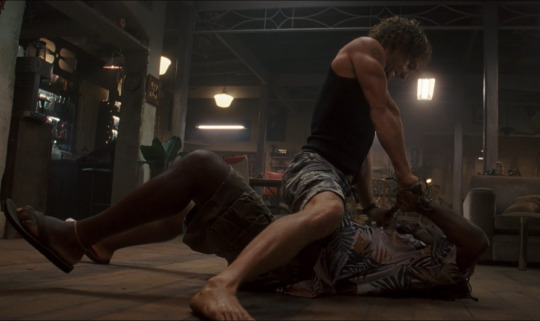
10/10
73 notes
·
View notes
Text
When it comes to the ASL brothers one “what if” situation I can’t stop thinking about the idea of. What if Sabo named dropped his brothers to Dragon at the grey terminal fires. Like in that scene where he clung to Dragon’s arm and spoke of his hatred to his own blue blood, what if he added in a plea of like “please save Ace and Luffy. They’re my brothers”
Cause like, I don’t know much about Dragon, I’m just wrapping up Zoh and heading to WCI. But he runs a fucking army so he’s not stupid. The name Luffy. Mentioned on an island in the east. As well as Garps home island (and maybe his too idk?) are enough connections to think. Hey, there’s a good chance that’s my fucking son.
But as I said, I really don’t know him well enough to tell if upon hearing this news would he be a “grrr I have a job to do. he will be fine. business bla bla bla >:[“ or maybe a “my sons a fucking child I need to make sure he’s ok >:0” I do think a small parallel scene to loguetown arc of like Luffy meets dragon would be hella cool (maybe he got lost from the bandits in the fire and Dragon beat up a pirate trying to hurt him) and they just stare for a moment before dragon points the way silently and Luffy runs off cause how tf do you pull the I’m your father card when your son is literally being traumatised right this very second.
But even if that DIDNT happen. When they eventually pluck a dying Sabo out of the water like a fucken grape. Dragon would know Sabo has more family there then just his parents, he had brothers. Would that result in Sabo being dropped back with them? Or maybe he gets his memories back earlier when Ace first makes a name for himself??? Would Dragon do his fucken research or at least encourage Sabo to early on in revolution school to find out what was left behind???
I SWEAR I NEED TO HURRY THE FUCK UP ON ONE PIECE SO I CAN START MAKING UP FICS AND AUS CAUSE I NEED TO MAKE THIS A THING BUT I NEED TO KNOW MORE ABOUT DRAGON TO KNOW WHAT IS AND ISNT A STRETCH OF HIS CHARACTER. RAAAAAAAA
#no major spoilers please I am but a humble screaming at 1am girl#am I offering up this idea on a silver platter for others? kinda#I just kinda wanna know what people would think dragon would do#but without like spoiling the actual show#monkey d. dragon#asl brothers#revolutionary sabo#monkey d. luffy#uhhhh#au idea#fic idea?#I refuse to believe dragon wouldn’t not care about Luffy#but he was also raised by Garp#so tough love is also an option#rambles#one piece
54 notes
·
View notes
Text
okay quick warning, but SPOILERS for The Owl House Finale! scroll past if u haven't seen!
Cool. So I saw another post v similar to this, but I agree and really wanan add to this statement:
Thank god the owl house did not do these things:
Main cast stop talking for ages trope
Got rid of magic trope
Main character losing all their powers trope
Magic world combines with Normal world trope
Bad person gets redeemed because everyone can be good trope
Kill characters just for the sake of death
Now, did the show HEAVILY tease every single one of these? absolutely. And I adore the show even more for it.
The whole "i can't wait to see everyone again," followed up with "Luz, it's been a week." HGFJVG very funny
Raine being teased to die constantly but being too cool for that shit? yes thank you i woulda hated if you died
The whole losing the original glyphs because the titan finally died, concerning but sure ig, but when King was revealed to have his OWN glyphs language?? YOOO, not only is that a nice thing to bond over, but it means Luz can keep on learning new magic while going to wildmagic school!
Everyone was still able to use their own magic! With them in the archives and being unable to use their magic, i was SO worried it was gone. But then it was immediately like "no bitch you're just stupidly exhausted"
AND BELOS' DEATH SCENE. Not giving into his manipulation anymore and just letting it happen was SO satisfying! Not only that, but the parallel to Eda accepting the curse as part of her and not letting it control her, VS Belos who tried using a curse as an excuse to be a bad person etc. Love that.
AAAAAAAAAA I could go on forever honestly. But all in all, great ending and I litteraly have 0 complaints. With the 3 episodes having to summarise a whole seasons worth of content, it was done beautifully. Thank you Dana and the whole crew for this amazing show <3
#the owl house#toh#toh finale#the owl house finale#watching and dreaming#the owl house spoilers#toh spoilers#owl house#owl house spoilers#GOD i hope i got all the main spoilers tags#i rlly dont like spoiling shows for people by accident#but i think i put enough?#feel free to mention other spoiler tags if i missed em :P
250 notes
·
View notes
Text
yet another chapter 236 analysis

haibara "butted into" nanami's "end", making nanami say a curse can save people too.


haibara's view was pure/uncynical, despite the difficulties of being a jujutsu sorcerer. i think nanami was able to find purpose/value in being a jujutsu sorcerer only after seeing things the way haibara saw them. nanami's flashback about helping the bakery worker comes to mind.
more importantly, haibara helped nanami feel like it was okay to pass the baton. [as it went: haibara -> nanami -> yuuji (also recently: nanami -> ino)]. in other words: haibara encouraged nanami to let others pick up where he left off, and not take on everything himself (what once was a burden, became a relief),
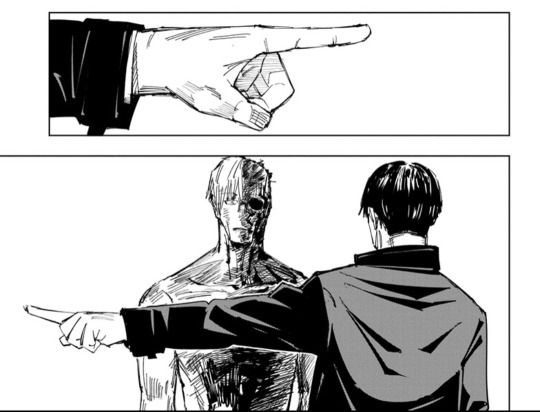
i think this is where nanami was coming from when he spoke about all this:


throughout his life, nanami wasn't the type of person that's open to entrustring everything to the next generation, but at the end he did so anyways. thanks to haibara. (currently in the manga, the theme continues. higuruma -> yuuji; to be a jujutsu sorcerer is to inherit other's will. keep the ball rolling).
what i find interesting is that the two of them are meant to contrast gojo and geto in some way. it's why their backs are to each other specifically in this arrangement:

i think in this scene, gojo opposes nanami in the way that he looked towards the past in his final moments while always being the type that betted on the future. whilst geto opposes haibara's outlook on jujutsu sorcery (to him it's an endless marathon).
moreover, just as a curse exists between nanami and haibara, i think it's implied that a curse exists between gojo and geto.
what type of curse, you may wonder?


love of course. when gojo says "i see" after nanami explains his "end", i think it's meant to show gojo's shifting view on what he considered his own curse: love.
(note that the phrase "the absolute strongest. the loneliness that follows. the one that will teach you... about love is..." also appears in chapter 236)
and there are already several mentions of love as a source of strength in jujutsu kaisen. particularly in relation to yuta who indisputably parallels gojo in vol 0.
initially, yuta accidentally cursed rika because he refused to let her die, akin to how gojo accidentally "curses" geto. that is, his love makes him avoid killing him for ten years as well as hand over his corpse to shoko— leading to the night parade of 100 demons, geto's body being possessed, gojo to become sealed, etc
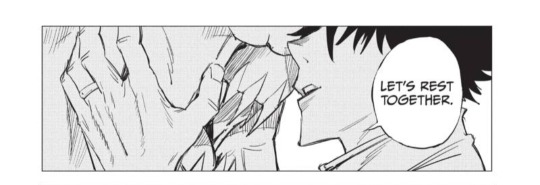
conclusion to the story in vol 0 being that while love can be an awful curse, it can also save people. think yuta's "this is pure love" vs geto's "then this is justice."/a great cause.
this is something gojo belatedly realizes or accepts in death.
love/geto saved gojo from the dreaded loneliness that comes with unrivaled strength. not just by matching his power, but by satisfying the vague thirst inside him for something beyond his strength. (sukuna goes on to call gojo greedy in chapter 237 for craving this satisfaction/love).
81 notes
·
View notes
Text
I'm trying to imagine what other Showfall Media shows are like.
Like, it seems like the section ran by the Puzzler is probably often a part of it, as he mentions doing this for 30 years and it's likely the Showfall employees who played his Rats are the ones who built the memorial to him.
Which I think means that the Puzzler is an example of what a 'sucessful' character becomes. I mean, just look at how Hetch describes what would happen if the audience chose "live".

"Rescripted, repurposed, and recast." But how'd he get a role as a mastermind who was aware of the behind the scenes? Well of we take what Hetch says about how the show usually goes...
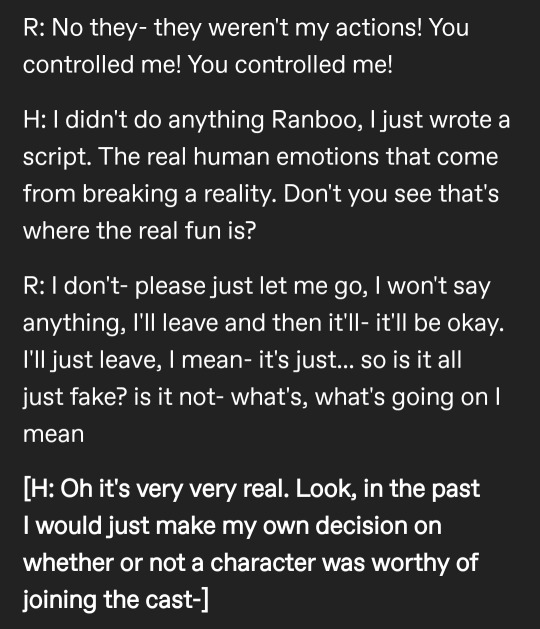
It sounds like Hetch often uses this "reality breaking" as a theme in his scripts, and perhaps it depended on how a character reacted to their reality being shattered if Hetch would deem them worthy or not.
It's not really clear what counts as "being worthy" but I'd imagine it counts as being entertaining, both to Hetch and the Audience... and maybe the Founder? The Founder's motives are super unclear, why does he want these shows? Why did he decide to test this world's Audience in a new experiment like this? Why did he give Hetch this role? How did he-
Ahem. That seems like a different rabbit hole for another time, maybe once we get more Generation 0 stuff (as it's been hinted to be about the origins? Of the Founder). Let's get back to what this might mean for what the usual show Hetch would run could be like.
It definitely involes horrific games and the characters reality slowly breaking around them. But I get the feeling Hetch and Showfall are rarely so explicitly involved in this.
And I think this might be because they werent broadcasting to any of their usual Audiences, they were testing this world for the first time. An Audience who has no idea who or what Showfall Media is.
I'd imagine whatever usual Audience Showfall broadcasts to, is probably either
a) from a world where real people dying for the sake of entertainment is fine, maybe not everyone enjoys it or think it's morally okay, but enough people like it and it's not illegal to watch people literally get physically and psychologically tortured on TV
b) are under the impression it's also fake. They still see the whole "reality breaking" things. But it's presented as completely fictional, maybe Showfall even let's the more successful characters live semi-normal lives in their off-time to give the full illusion all these people are really just actors.
c) a world that's not even remotely parallel to our own in any form, maybe not even inhabited by humans. After all, Hetch makes references to the fact he runs this show for years far longer than a natural human lifespan


d) all of the above separately, we are being told we're getting a viewpoint into infinity. And Hetch clearly has all the time in the world to make any kind of show he wants, as long as it fulfills the purpose the Founder have him.

And ah shit now that I'm reading this again I just noticed they refer to our world as "one of the few we can entertain". Nope not unpacking that here, I still only gave 3 possibilities and when compared to literally "infinity" that still falls under "one of the few".
#i once again just started brainstorming#generation loss#genloss#genloss tse#hetch genloss#showfall media#spud originals
213 notes
·
View notes
Note
Do you think Gege can confirm Saturo and Suguru's relationship, will he say they loved each other or will he make a moment of them at the end of the mangá
In short, I wouldn't be surprised if Gege doesn't confirm any kind of romantic relationship between Satoru and Suguru, but if it's going to happen, I think it'll happen at the end of the manga like you suggest. I actually have a lot of thoughts on this topic, so buckle up!
Unfortunately, artists rarely get the creative freedom to tell the story they want to in exactly the way they want to. Homophobic attitudes still persist and it's highly possible that Gege Akutami's superiors won't risk sales by sanctioning the unambiguous depiction of a romantic relationship between two male characters. However, they would potentially deem it more permissible at the end of the manga when it's less likely to have a significant impact on profits. It sucks, but it's the unfortunate reality of the situation.
However, I think there's an argument that Gege censored Gojō's last words to Getō as a way of reclaiming control of the narrative for himself. Jujutsu Kaisen often depicts a clash between traditional attitudes and more progressive thinking, and Gojō embodies that more than anyone else in the series.

He openly criticises the higher ups that maintain the status quo, but recognises that he can't force change by taking drastic action alone. Therefore, he settles for creating a sea change slowly, playing by the rules to achieve his goals, bending them but never breaking them — and I think that's what Gege did with Jujutsu Kaisen 0.
Let's imagine that Gege wanted to tell the tragic love story between Gojō Satoru and Getō Suguru but knew he'd never be able to get it published in a mainstream shōnen manga anthology. Instead, he includes it as an intriguing B-plot in a tale about a boy and a girl cursed by love, deliberately creating heavy parallels with the main story.

By doing that, he avoids having to address the exact nature of the relationship between the characters in the B-plot, because they're not the main characters. However, even though he can't explicitly address the nature of the relationship, he ensures that readers understand the gravity of it by including a scene where Satoru utters something to Suguru at the emotional climax of the volume while keeping the actual words he says a secret.

It's clear to the reader from the way Suguru responds and the context of the scenes surrounding it that there is love between these two characters — it's just the type of love that's up for debate, but that's where I think it's really smart. Rather than having his work censored by editors, Gege censored it himself. By doing so, he generated a fascination with the scene among readers, perhaps drawing more attention to the relationship than if he'd included Satoru's words for everyone to see. To this day, the nature of their relationship remains one of the hottest points of discussion in the Jujutsu Kaisen fandom, and I think that speaks for itself.
So, Gege is Gojō, playing within the confines of the rules to achieve his goals, bending them but never breaking them, creating slow, meaningful change that way. But that's just my hypothesis!
Truthfully, I'm OK with their relationship remaining unconfirmed because of everything I've just said. For me, the relationship is compelling because it's implied in tiny, beautiful ways but never confirmed. I don't think it's queerbaiting because it's never been the main selling point of Jujutsu Kaisen, and Getō was already dead when the events of the main story began, so most of the relationship development is done retroactively through Hidden Inventory in order to further Gojō's story.
As I already explored in my pre-236 analysis of Gojō, until very recently Gege kept Gojō at a distance from everyone as a way of demonstrating his isolation. By keeping his eyes covered up and his cursed technique active, no one can get close to Gojō. We don't get to know how he's feeling or what he's thinking, but characters and readers still make a lot of incorrect assumptions about him — more on that here. For his relationship with Getō to be yet another thing that people speculate about, saying with absolute certainty that it's one thing or another, is kind of beautiful to me.
Of course, I'm not going to be upset if Gege *does* confirm their relationship before the end of the manga — if only because it'll shut down a certain section of the fandom that insists shippers are merely projecting romantic implications onto the subtext, as though it's possible to neatly place relationships between friends and relationships between lovers into entirely separate boxes.
Having said that, as the reaction to 236 shows, not even Gojō directly telling us how he feels is enough to prevent people from thinking they know better — so maybe even official confirmation wouldn't be enough to convince some people!
That really shouldn't matter anyway. Something I've really enjoyed over the last year is seeing more and more people come around to the idea that perhaps Gojō and Getō *were* more than friends after all, especially those people who would usually criticise others for 'ruining shōnen' with shipping. That's the slow sea change I'm talking about!
Thanks for the question, I really enjoyed thinking about this ♥
#jujutsu kaisen#jjk#呪術廻戦#jjk meta#jjk analysis#jjk spoilers#gojo satoru#geto suguru#satosugu#sugusato#ask fushiglow
78 notes
·
View notes
Text
No Entry: Voyeurism and Reality in the DFF Finale
Wow I’m getting to this so late cause life got in the way, but I’m back on the DFF meta train for a short bit more!

I wanted to look at the finale through the lens of voyeurism and gaze. I’ve written already about how DFF draws on found footage traditions here and about different levels of voyeurism the show employs during sex scenes here. I’ll definitely be drawing on both of these posts and picking up some threads, but hopefully it doesn't feel like a requirement to go read them. One thing I’ll be mentioning frequently here is levels of voyeurism, so I want to lay them out again:
The typical gaze of the camera. Here there's no obvious signals or framing of voyeurism apart from the natural voyeurism inherent in filming and watching any piece of visual media.
We know a character is being watched but we don't see the watcher doing this. Perhaps a character expresses feeling watched or thinks they saw something. At this level we may stay in the perspective of the character being watched or an outside perspective where the watcher remains off screen.
The gaze is mediated in a way that evokes watching. For example, through a camera, a window, or the first-person viewpoint of the killer (common in horror). The voyeurism becomes more obvious and experiential. We're implicated more explicitly in the gaze but not necessarily in a way that forces the audience to reflect on this fact.
We see someone else gazing in a mediated way. Hannah Bonner puts it best in a chapter she wrote about Cabin in the Woods and other films with surveillance: "The voyeur is no longer just the audience, squirming in their seats from Michael Meyers's point of view as he tracks down his naked sister and her boyfriend in Halloween...now the audience as voyeur watches the voyeurs watch the surveyed" (90). This gets meta on the viewer.
0. This is when we don’t even get to see what happened. There isn’t any gaze because what occurs happens off screen and is only mentioned or hinted at. This comes up for example when Non and Phi are implied to have had (but not shown to have had) sex.
There are a number of ways that the finale of DFF plays with gaze and voyeurism that are really interesting to me, so let’s jump in!
Jin’s Hallucination (aka Holy Level-5 Voyeurism Batman!)
It makes sense to start here, since Jin’s sequence centers around sex and voyeurism in pretty obvious ways. In my previous post, I noted that Non and Keng’s scene is one of the only moments where we move into level 4 voyeurism. We watch Jin filming Non and Keng and the show starts to ask us to reflect on surveillance and our perceptions of sexuality and SA. Jin’s other sex scene with Phi stays steadily at level 3 in the way it’s shot, though we get a lingering view of the dog/astronaut that almost seems to threaten level-4 voyeurism but doesn’t quite get there. The camera’s gaze turns on Jin in a way that reflects his guilt and foreshadows his hallucination in the finale.
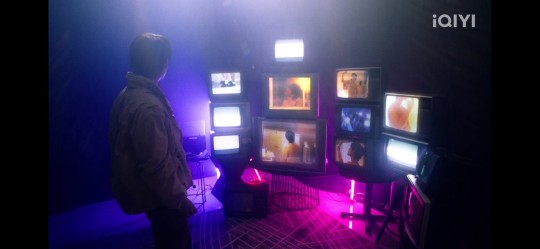
As we enter Jin’s sequence, the dial is immediately set at level 4. We watch Jin viewing himself being surveilled. In an interesting turn Jin is both a voyeur and the surveyed. It’s a moment that parallels the early scene in episode 1 where Tee stops the group from viewing him and White via the surveillance cameras. But, as I'll note further in, Jin can't make it stop.
The show flashes between the scenes in the TVs, moving us down a level or two as we enter the scenes playing in the screens, and images of students with their phones recording, moving us back up to level 4 territory.
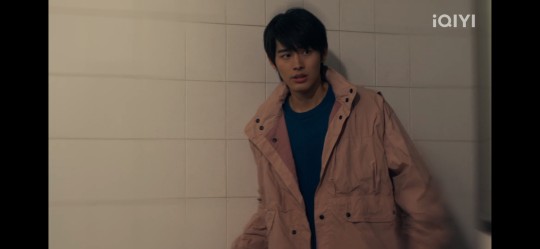
Jin then enters the bathroom, seeing himself having oral sex. Sex Jin makes eye contact, putting us at level 3 voyeurism as we take on voyeur Jin’s perspective (what is often the gaze in horror of the killer, but here the thing chasing him is his own guilt and his own self whose gaze he returns).

And then the show amps things up. So far we’ve oscillated between level 3 and 4, but then students file into the bathroom with their phones and we get an entirely new level of voyeurism: level 5! The audience (us) watches Jin watch people who are filming (using a mediated gaze) and watching hallucination Jin have sex. Jin’s double presence in the scene allows for a whole new level of voyeurism in the show.
*side note: Copper watched this in a theater with fans. So we have Copper watching the theater audience watch him as Jin watching people using cameras to watch hallucination Jin have sex.
We get flashes of the filmers (level 4), the sex (level 3), flashbacks of what Jin did (level 4), and Jin watching all this in horror (level 5). The changing levels keep the sequence frenetic and intense, both visually and thematically. And of course, the show smartly has held off on level 5 until the finale/climax of the show. From an overall structural perspective it’s a very smart way to build the show’s tension. Our first four episodes stay lower, spiking to level 3 but largely staying at lower levels. In the flashbacks our ceiling is raised to 4, but we also get a new floor with the 0 of Non and Phi, and the show moves around through levels 0-4. Then suddenly in the finale our ceiling is moved even higher again for the most intensity and impact possible.
It reminds me a lot of dynamics in music. The early verses are soft and grow to the first chorus, the next verse goes much quieter to contrast with a louder second chorus, a bridge comes in, and then the final two choruses hit big. You don’t want every moment to be at the max or you won’t have anywhere to build to. DFF holds off on level 5 so that it can go big in the finale in a similar way.
I think this sequence is also interesting in how it frames Jin as both voyeur and surveyed in Hanna Bonner’s formulation. Jin takes the role that we the audience typically would in level-4 voyeurism. I wrote a bit in my previous post about how level 4 gets meta and asks us viewers to reflect. Here, Jin takes that role instead, and it forces him to face his guilt and fear in a self-reflexive way.
This isn’t to say that this is a freeing process or one of heroic self-growth, but it is one of awareness filled with the pain of encountering guilt. As he stabs himself, Jin apologizes but also says “I’m guilty. I know it now.” This knowing suggests that this has come from Jin being painfully self-aware.

Placing Jin in what would typically be the audience's role (voyeur) also allows him to act in a way that we cannot. We see him try to pull Keng off of him, try to stop the filmers, and then smashing the TVs. It embodies an impulse we may have had as viewers in other moments of the show, especially as we watch Non being hurt over and over--a desire to step in, to stop it all. But we can’t. No matter what level of voyeurism we’re offered, we can’t cross the fourth wall in that way, and so the show keeps going on; things spiral forward, a painful piling up of cause-and-effect, and we watch the dominoes falling.
Jin is placed here in a unique position as both viewer and surveilled. He can, in theory, cross the fourth wall to intervene and stop this. But that just makes his lack of control all the more horrific. It mirrors the way the video of Non and Keng circulating took away Non's agency and control over how the world perceived him.
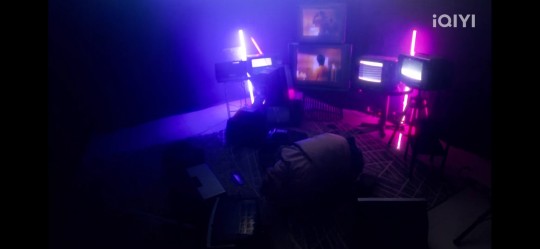
Jin can’t stop the sex, the people filming don’t even acknowledge him, and there’s no button or remote control that can turn off the TVs. The TVs Jin smashes only show what has already been filmed. Jin tries to smash the TVs and some turn to static, as if he can force his way out of seeing this, force the scene itself out of level-4 voyeurism, denying himself and us viewers the gaze.
But unlike the local storage of a phone, the TV screens aren’t the source of the recording data. It parallels the moment that Jin short circuits his computer, while the video he recorded uploads to the internet. The footage is already circulating; no short circuiting of computers, smashing of TVs, or guilt will stop the damage.
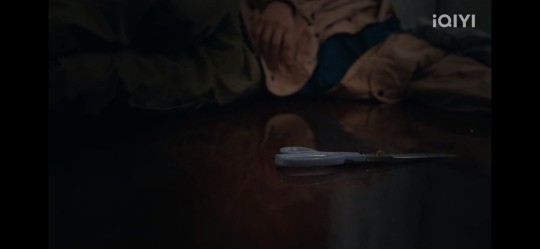
The only way to stop it all is to go back in time, and stop the footage from being recorded to begin with. So Jin apologizes as he stabs his hand--a hand used to hold a phone or a camera, a hand that can record.
Fluke's Hallucination: Voyeur/Bystander
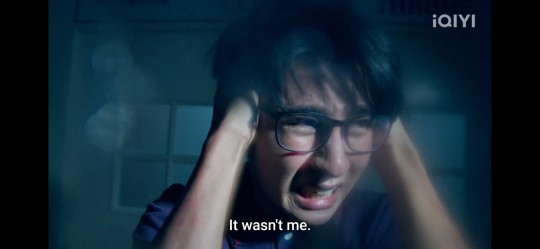
If we’re talking about gazing and voyeurism, it also makes a lot of sense to think about Fluke, our bystander. Even till the end he equates inaction with a lack of culpability. As we enter his hallucination he says, “It wasn’t me. I didn’t do it.” But other voices show his fear: that the world will not believe him, that he will be blamed regardless of his own perceived lack of involvement.
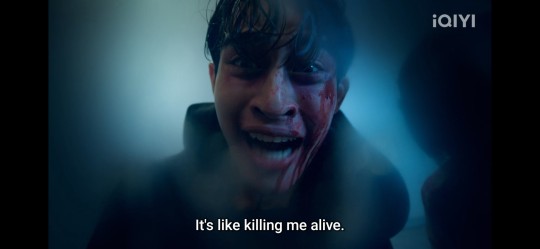
However, Non steps in to set Fluke straight. When Fluke tells Non he wasn’t responsible for the sex tape, that it was all Jin, Non replies: “But you didn’t stop him. It’s like killing me alive.” Here, DFF quite clearly criticizes bystanderism and the assumption that it equates to a lack of involvement, responsibility, or guilt.
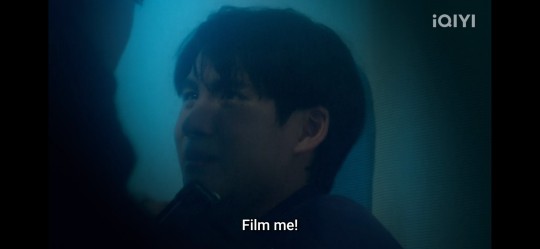
Non tells Fluke to film Non and Keng and forces Fluke to take the camera. Of course, in the real world, the camera he’s guiltily raising to his face is actually a pair of needles that will blind him. He refuses to act on the harm he sees, so the solution is to not have him be able to see at all. Then he can’t have the future he has tried so hard to protect at Non’s expense.
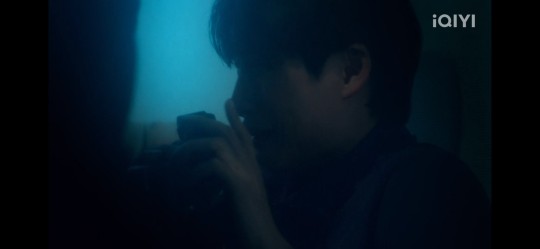
Interestingly, hallucination Non forces Fluke to take up the camera and move into level-4 voyeurism. He’s forced to look at what he metaphorically turned a blind eye to. Perhaps because the consequences of him filming would be the same as when he let himself pretend his own gaze was value neutral. By forcing Fluke up to level 4, the audience is also drawn in again in a meta way to reflect on not just Fluke's role as a bystander but perhaps our own as well. In a show framed by voyeurism, a show that deconstructs easy binaries of guilty and innocent, what is our own culpability as an audience?
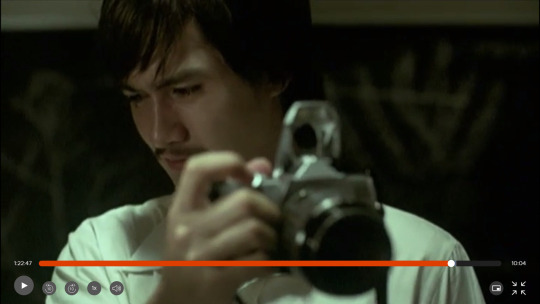
This moment also has a striking similarity to the film Shutter, which I mentioned in my found footage and tech post. I talked about how Shutter touches on themes of bystanderism and guilt, mostly linking this to Jin. But the parallel is made here as well with Fluke as he is positioned to do what Jin did and what Tun did in Shutter: film/photograph SA. Notice how Tun, despite taking the photo, turns his gaze away from what is happening as if he can remain uninvolved, much like Fluke does throughout DFF. Fluke struggles and looks away from the camera Non forces on him, but ultimately we know he can't keep turning his head away. He looks at the very moment he blinds himself.
On a side note, part of the modern version of the Hippocratic oath states the following: "that warmth, sympathy, and understanding may outweigh the surgeon's knife or the chemist's drug." Fluke lacked this sympathy or understanding and in the end it was a doctor's tools that punished him, the needles used to stitch patients and the chemist's drug that New releases. Maybe I'll do a whole breakdown of the oath and Fluke, we'll see.
The Viewer and Reality
Earlier I asked the following: In a show framed by voyeurism, a show that deconstructs easy binaries of guilty and innocent, what is our own culpability as an audience? I want to unpack that a bit here by exploring how the show's finale situates us as an audience and plays with our perception and gaze.
I've mentioned how level-4 voyeurism takes things to a meta level, asking us viewers to reflect on our own judgements, perceptions, and assumptions. This is often centered around sexuality and morality via the sex tape and Jin's hallucination. However, this theme goes beyond sex, as we see the various ways almost every character operates with limited assumptions of who Non is. They all think they see him correctly, but this limited perspective is deconstructed, at least for the audience, as we increasingly see more of Non's life and the consequences of everything play out.
As I put it in my previous post: "The show clearly has a lot to say about what it means to surveil others and about the ways our perceptions can do others harm". There's a particular violence in watching and in placing narratives on people. I'd argue that even in the finale, DFF remains aware of and willing to critique (or at least play with) the narratives and assumptions we as an audience try to place on the show more broadly.
The Final Shot

I've already talked a lot about how the final episode plays with levels of voyeurism, even giving us a level 5. What I find particularly fascinating is how these levels are paired with some of the shows most graphic violence. We see so much of these character's physical and psychological pain in the finale.
But when all is said and done, what we close on is a level 0.
This move is actually pretty similar to The Blair Witch Project, which I wrote about in my found footage post. One thing horror scholar Heller-Nicholas notes is how the camera in found footage films is in tension with the audience's desire to look at what we want to see. There's a frequent and deliberate denial of full visual access that often adds to the horror. DFF isn't found footage, but it does make similar moves through framing choices that gesture towards the camera's limited and narrowed scope.
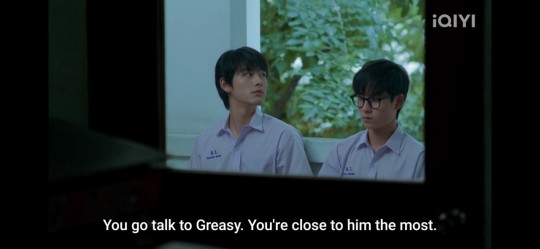
Such shots box the characters in and imitate camera framing and a mediated gaze.
The ending shot of the show doesn't implement such obvious squared framing, but it relies on us being visually cut off nonetheless. We're pulled out, past the gate, so only a small bit of the house remains visible. What we want to see as an audience is inside, in tension with what the camera can and will show us.
While not identical in aesthetics, the principle remains the same as found footage. At the end of TBWP, the camera drops, we're left looking at a blurry image of the floor, while the fate of the characters remains entirely unknown. Our visual gaze and our narrative insight are denied. All that remains is the sound of the camera rolling, just as all we hear is the sound of a lighter as we end DFF.
In the end, when the credits roll on DFF, we don't know if anyone left the house or even what was a hallucination or reality. What we just watched voyeuristically is all called into question, and we are shut out. Whatever did or will happen in the house, we won't be the one's to see it; our gaze is denied as are our attempts to place any sort of definitive interpretation on the narrative.

Throughout the story we have moments where the line between private and public is horrifically crossed often through the use of cameras, but in this final moment the private is reinforced again. The line is redrawn, emphasized with the "No Entry" sign outside the gate which marks the house as a private space that we no longer have the privilege of entering. The door is both literally and metaphorically closed.
*Side note: I think there's a whole other post worth of discussion here on the harm caused when our priorities of what should be private vs public get warped and collectivity fails. But in a sense, perhaps the audience too is caught up in this failure, as bystanders who failed to intervene, and we are left only with the horror of unknown fates hidden behind a marker of private property.
Our Myths and Reality
This closure is also really interesting in a show that centers a struggle over authorship and directorial control. The tension between Por and Non plays out class and power dynamics and raises questions about who gets to tell what stories and what/who gets made invisible. So what can we make of an ending that renders everything and everyone invisible? When there's no director left to present their visual or narrative interpretation of reality?
We're left instead completely unmoored from any sense of what the show's reality is or was. And I think this is an interesting play on and subversion of the type of reality fiction offers us.

Once again, in her work on found footage Heller-Nicholas notes how the genre has come to rely not on "...our gullibility, but rather our willingness to succumb to the myth of the real that these films offer..." (26). I mention in my found footage post how DFF gives us many examples of characters and society falling into their own myths of reality and placing these on others (such as Non) to harmful results. And it's quite telling that the true found footage film (the sex tape) is taken as more of a window into reality than the found footage horror film the boys produce. People on social media interpret the tape of Non as a reflection of reality, but what they express are the myths and narratives they hold about sex and morality, rather than an objective truth.
As an audience viewing a narrative, we also bring our myths, biases, and narrative desires to DFF itself. And in the end the show makes an interesting move in how it chooses to end the show while subverting these impulses.

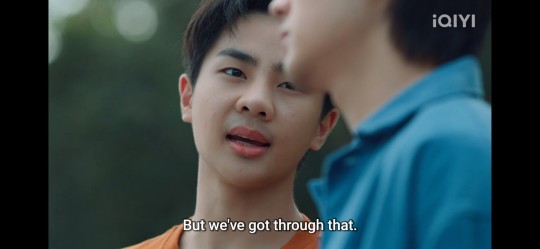
First it offers us a possible ending. One where things return to "normal," where the heroic romantic couple are together in proper BL fashion, where they survive but live with the trauma. Phi even becomes a director, making sure that role isn't left empty. Tee's ending is very similar to Tun's in Shutter, where a mental breakdown is seen as apt punishment for guilt. The idea of the final girl carrying on the trauma of the slasher is a trope in itself. These all perhaps play on assumptions we have of how such narratives should go, our very own myths of reality as it should play out in fiction.
Then DFF pulls the rug on this myth and any sense of verisimilitude. We have no sense of what the show's "reality" is by the end, and no comfy myth of the real for us to return to. We're left asking "what really happened?" while the show says "what is real?" Because the camera is far from a reliable, objective tool to see the world.
While I think there were some issues with pacing in the finale, I still think this is a really cool move. It fits so well in a show about the harms of the fictions we place on reality and real people. And to turn that critique up to a meta level that messes with the audience? I love it!
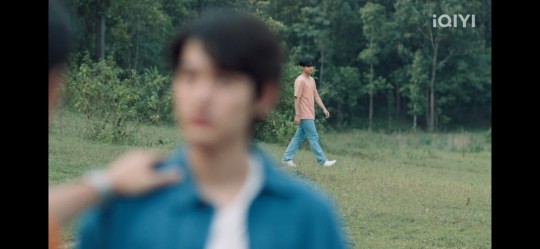
I also think it's especially powerful and tragic that, in the end, it is only in a space where there is no "reality" or solid narrative of what happened that Non can be present. He was harmed so much by the weight of others' narratives, rendered invisible. But his presence is unrelenting in the finale, driving the hallucinations and breaking through the more clean cut ending mythic ending. It's in this liminal space, where the real falls apart that he can haunt and be visible.
And perhaps in a story where Non's privacy was violated, where he was subject to the perceptions of others in cruel ways, the best kindness the show can offer its characters is a final, horrific moment of privacy, where not even the audience can perceive them.
Sources:
Heller-Nicholas, Alexandra. Found Footage Horror Films: Fear and the Appearance of Reality. McFarland & Company, 2014.
Bonner, Hannah. “#Selfveillance: Horror’s Slut Shaming through Social Media, Sur- and Selfveillance.” Gender and Contemporary Horror in Film, edited by Samantha Holland et al., Emerald Publishing, 2019, pp. 85–99.
Shutter (film, 2004)
The Blair Witch Project (film, 1999)
#another one that makes sense in my head and I'm hoping makes some sense on paper#dff the series#dead friend forever#dff meta#dead friend forever meta#my posts#my meta
36 notes
·
View notes
Text
Looking at all of the messed up boss forms during the Neutral Flowey fight
I just want to talk about them i like them a lot. i was very obsessed with help_tale when i was younger and that's probably why. spoilers below cut, and body horror warning because of the topic ofc.
Decibat

Starting with Decibat, no eyes and a stomach mouth. Awesome!! The stomach mouth kinda goes along with Decibat's noise theme - HUGE MOUTH is loud and Decibat wants quiet.
Dalv
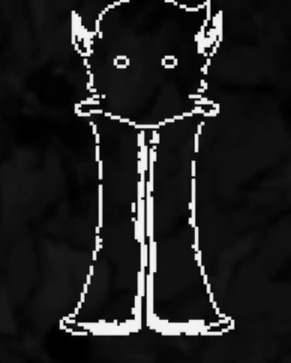
Out of all of the Flowey forms only 2 actually made me jump and this is one of them. Creepy eye things get to me and that’s why this is one of my favorites. It's really simple but it's great. Also the way it glitches sometimes makes it look like he has more than 2 eyes, which I'm not sure if it's on purpose but it's still neat!
I do wonder what would be under the cloak, like would it just be normal Dalv? The void? Something like the Deer Lord from Spooky’s Jumpscare Mansion? idfk. His face being obscured is like how Dalv obscures his face with his cloak for the majority of Dark Ruins, and since we don't really get to know him due to killing him, we don't get to see his real face..
Martlet
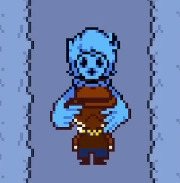
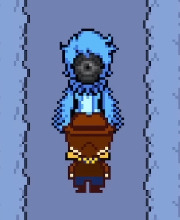
Martlet technically doesn’t have a form like the others but I didn’t want to leave her out. This scene does a great job at being unsettling with the lack of talking portrait and the slowed down Snowdin imo. i really like how her hugging animation changes for just that One Frame, it's slow enough that you'll probably catch it but quick enough that you might be wondering if you imagined it.
And then there's the whole "I'm so happy I found you! So happy I found you. I found you." that happens and then her face melts to reveal the Eye. The eye is in grayscale, like Flowey is during the second phase of his fight, so I wonder if it's meant to be HIM looking at you through Martlet.
And the melting parallels her death in No mer- hey wait, why does Martlet melt in both routes where she dies? Like??? I mean, she does have connections to Alphys and the True Lab so like...or maybe i'm just over thinking it. Either way this ones cool, if I knew pixel art I would try to make a form for her like the others have.
El Bailador
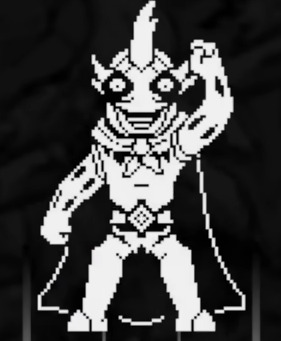
I think a lot of people believe this is the scariest one and....yeah. This is the other one that actually made me jump. The smile, the Eyes, it's fucking scary i hate this one (positive). The large strained smile goes with how El Bailador wants to make everyone happy with his dancing even though some prefer quiet, which he doesn't realize. does that make sense idk if that makes sense.
Starlo
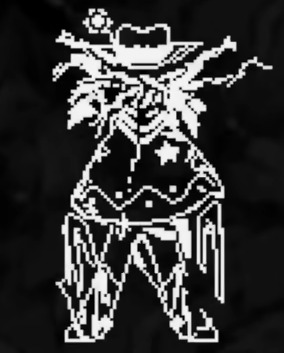
Oh boy plant growth body horror! Yeah this one’s good. The vines growing out from his face, the weirdly elongated hands, the way the piece of straw on his hat changes to a flower. Honestly I have 0 clue what is going on with his face. Very cool. I also just noticed the holes in his poncho, like bullet holes? i saw someone say he's still hot on twitter and im scared
Ceroba

Ceroba's gets bonus points for being one of the rarer ones, because you have to abort a No Mercy route to see it. Besides that, no face! Wahoo! Plus her bow has changed to have a flower in it, which matches Starlo.
My favorite thing though is that the way pixels are scattered (i cannot find the right wording for this) kinda makes it look like she's constantly turning into dust which is really cool!! I think her face might be obscured for the same reason as Dalv, considering you have to be in No Mercy to see this you never get to know who Ceroba is.
Guardener
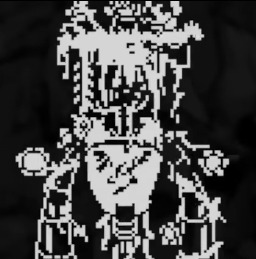
Overgrown robots overgrown robots overgrown robots. She already was overgrown but it gets more turned up with this one which makes me very happy, I love overgrown robots and machinery. All the vines get changed into flowers as well to fit, yippee! The Delta Rune logo on her chest is also scratched out, which is one way to send a message...
Axis
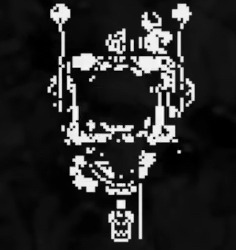
I like how the lack of face here parallels both how axis dies in No Mercy AND the death of the blue soul. This one's very cool, though i wish there were some more wires in his face like his death sprite in No Mercy has. thats a weird thing to wish for isnt it. Actually now that I'm looking at it more, it kinda looks like a mouth? That might just be because of the things at the top and bottom, I'm not sure if it's meant to be a mouth.
Oh! And the heart in his chest is missing, which hurts because both ways you can spare him involve filling his heart (either with Daisy or compliments. Also, Axis' neutral route spare is extremely cute, please go check it out if you haven't seen it.)
anyway thanks for reading through teehee my favorites are probably dalv’s ceroba’s and guardener’s. i have to wonder what the Feisty Four would have looked like in this? They don't get any because well, they don't die, but I like them...I don't really have any ideas myself, though. ok bye
50 notes
·
View notes
Text
farleigh analysis PART 3, because i might as well do the entire movie at this point. i'm locked in. this is going to cover the early-saltburn summer era. AKA, oliver's once in a lifetime, hand job on a haybale, golden big boy summer. everything after venetia and oliver's sex scene is in another post on my blog. this one is pretty short.
[0:34:42] (they're watching superbad. teehee.)
farleigh looks borderline revolted in the background of this shot, which is so funny to me. superbad is, in my opinion, notoriously rude. the comedy is hollow, childish, homophobic, etc. even seth rogan admits that the movie is tone deaf and aged horribly. that's neither here nor there, though. all i'm saying is that i can't imagine farleigh would enjoy the movie as a queer person.
[0:35:19] elsbeth: is that right, he had to put his fingers down his mother's throat to make her sick? farleigh: yeah. felix: farleigh, that's private stuff! farleigh: well, you told us. felix: in confidence!
when elsbeth initially asks the question, she's looking directly at farleigh. yet, when felix confronts farleigh about discussing private matters, farleigh responds with "well, you told us." meaning the family, i assume. felix had no issue with elsbeth and pamela discussing oliver's home life until farleigh was very moderately involved. it's odd to me. and yes, felix is the one that told them. moral superiority, or something. having someone to blame, even when you enabled their gossiping in the first place.
[0:35:34] elsbeth: we should give him the most wonderful time! farleigh: good luck, he doesn't smile much. elsbeth: farleigh seems to think he's ghastly. why are you friends with him, darling?
really, you can tell that elsbeth likes farleigh. she respects his opinion to a certain extent. i also talked about the tutor scene in part 2, and how i consider the "style over substance" debate a metaphorical parallel to farleigh over oliver. here, farleigh once again points out the style of oliver's social interactions: he doesn't smile much. when you look at this from a social and... neurotypical perspective, lacking a smile during conversation can mean a lot of negative things. farleigh seems to have a dedicated focus on arbitrary social expectations, largely because he has to.
[0:35:33] farleigh: and here he is now! we were just talking about you. elsbeth: don't be silly! farleigh, you just make up the most awful things. of course we weren't!
once again, in traditional catton fashion, farleigh is scolded for saying doing something that contrasts the cattons saviorism. obviously oliver knew they were talking about them. i can't blame elsbeth for attempting to backtrack, but "farleigh, you just make up the most awful things" is a weirdly unnecessary throat punch. she's stepping on farleigh to appear taller, if you will. at 0:36:34, when elsbeth asks oliver to sit by her, farleigh looks so exceptionally irritated. he rolls his eyes, looks back towards his computer, and sighs dramatically. wonderful. he's so sick and tired.
[0:37:20] elsbeth: i've lost so many friends to addiction. so, so many dear, dear friends. it's the root of poor pamela's horrors too, i'm afraid. farleigh: and the only interesting thing about her. elsbeth: farleigh! no, she is rather dull, actually. but she's so beautiful. you have to admit, she's very beautiful.
elsbeth and her obsession with physical appearances. once again, style over substance. and her outrage at farleigh refusing to soften the blow on his statements, before following it with her own (albeit less crude) dig at pamela. style over substance. wouldn't it a little uncanny, a little scary, to be the only person of color in a household that places physical appearance on such a high pedestal? especially a household as ignorant as the cattons. that's just conjecture, though. oliver has the ability to manipulate a space for himself in the family without sacrificing any of the qualities he began with. he never really smiles more, throughout the summer. he never really loses his signature awkwardness, his imposing energy.
[0:40:05] elsbeth: you know we're delighted to have you for however long it is you mean to stay. farleigh: forever...? pamela: oh, no. i think i might have, erm, found somewhere. elsbeth: oh, well done, darling! james: oh, good!
right after james says "good," you can see farleigh turning to look at him. prompting james to drop the hatchet on pamela's prolonged stay at saltburn, i'm assumng. this is what's interesting to me, i think. again, farleigh lacks the drive to play the same game as oliver. farleigh doesn't want to nurture the charitable actions of the cattons. farleigh believes the other guests at saltburn take up the space that he would otherwise fill. just like at oxford, when felix is sitting with someone else, farleigh is discarded. when elsbeth invited oliver to sit next to her, farleigh looks annoyed. the cattons capacity for attention and kindness is depressingly small. farleigh isn't playing chess, he's trying to win by sheer survival of the fittest.
for the next few, brief scene of farleigh and oliver interacting, oliver repeatedly proves that he does his research. i can't get over it, to be honest. neither can farleigh; if looks could kill, oliver would've been dead within 10 minutes of arriving at saltburn. the methods farleigh and oliver uses to remain relevant in the catton catalogue are so wildly different. farleigh, who uses his personality and social skills to keep the cattons entertained and charmed by him. i'm sure he loves to gossip with elsbeth, wine and dines with venetia, and he clearly does everything in his power to stay glued to felix's side throughout the school year. this is someone who has never considered manipulating the cattons; he just wants to be one of them, and he wants it to be easy. can you blame him?
#saltburn 2023#saltburn#farleigh start#oliver quick#felix catton#elsbeth catton#rararararara#i'm off the henny or something like that#yipee!#movies :P
58 notes
·
View notes
Text
i'm so mad at gege after the last episode cause it made me start thinking about female characters in jjk so here i am.
(jjk anime and manga spoilers ahead)
nobara is such a great character, she looks like the usual "girl of the trio" for like the first two seconds you know her but she's so much more and SO BADLY USED IN THE PLOT EXACTLY LIKE SHOKO
everything about yuji/megumi/nobara is a sort of parallelism with satoru/suguru/shoko but it doesn't work out completely cause we know almost nothing about shoko and the little we do know it's mostly written in the extra volume about jjk characters and techniques, it's not like gege actually tells us more about her in the plot and he could have done that in the hidden inventory arc even if it was meant to be focused on satoru and suguru AND THIS MAKES ME FURIOUS
like okay you just want a female character with healing powers? great (not great, but let's not focus on this rn) BUT AT LEAST MAKE HER ACTUALLY HEAL SOMEONE???? I LOVE HER BUT SHE'S SO USELESS, EVERYONE DIES IN SHIBUYA AND SHE'S JUST THERE DOING NOTHING WITH YAGA BECAUSE SHE CAN HEAL BUT SHE CAN'T FIGHT??? HELLO???
in the hidden inventory arc she's not even involved in missions, we have more scenes of her in the opening/ending that in the actual episodes. i don't need to know her whole story but if you put her there as the only character (beside satoru and yuta) who can use reversed technique then MAKE HER ACTUALLY USE IT WHEN NEEDED
and no, i'm not talking about this just because i want our beloved satosugu back. as a suguru kinnie i'm 100% convinced that his death was the only right option for his character from the moment he left jujustu tech. i have some mixed feelings about gojo's death but just because i think gege could've handled it better, not because i absolutely need him back like some delulu maniacs in the fandom (no offense, i'm suffering with you all but some people are crazy). but in shibuya she could've been more useful, at least in helping the students.
nobara at least has a strong personality and a cool technique, she's not just another sakura or orihime (i hate orihime but sakura is great too ofc, i just mean that nobara unlike them isn't the girl put there just to heal her male companions and have a crush on one of them) or shoko herself (and thinking about it shoko is even more useless cause sakura and orihime at least help and heal their crush).
we know a lot about her past, i was crying like a baby watching her say goodbye to fumi and then... she dies, just like that. her goal isn't even that difficult to achieve, it's not some big dream like suguru's, it's something extremely personal and she's not gonna reach it cause gege killed her. i love nobara too but honestly she doesn't have that great development merely because she dies before she can actually become stronger. everytime she fights she gets severly wounded or is there to support others or she's the one who needs support. i feel like she doesn't have her big moment before dying (like maki does for example, i know she's not dead yet but i wouldn't be so mad if it happened cause she has a great development since jjk 0. i would cry like a baby again though, pls gege don't kill her i'm begging you).
and no, i don't think nobara's death is necessary for yuji or the plot in general either. yuji has already seen nanami die in front of him, sukuna has killed who knows how many people and he could do nothing about it, he was still mad at mahito for junpei so why kill nobara too?
gege doesn't even show her in the afterlife when gojo dies (and a delulu part of me hopes that's because she's still alive), like i know that in that airport there are people from his past and the focus is on them, his blue spring and whatever but damn she's one of his students too, he talks about megumi and the fact that he still had things to explain to him but he doesn't even mention her? (he doesn't mention yuji either okay i know, i would've liked that too but at least they have a cute moment before the fight against sukuna).
instead of focusing on those that should be the main female characters we have mei mei though. don't get me wrong, she's our mommy, i'm barking (respectfully) every time i see her on screen or in the manga but is all that screentime really necessary? do i really need to see her in bed with ui ui or walking like a runway model for minutes? mmmh i don't think so.
i don't know, maybe i'm the one missing something in this story, maybe i'm not getting it completely but still, as much as i love jjk i'm mad. i could go on for days about this and what's happened in the manga these last few months, but i'm gonna stop for today.
at this point i'm convinced that gege introduced too many characters and he can't handle them properly, unlike other mangakas like horikoshi who literally shows you the backstory of every single kid you see, even the one drawn in the corner of a panel in that one chapter that everyone forgot about (horikoshi has problems handling fem characters too, but this is a whole other problem and it's something that involves a lot of different animes/mangas).
that's it, going back at crying now, thinking about how my life could be way better if i put this same effort in my studies.
#jujutsu kaisen#jjk#jujutsu kaisen spoilers#jjk2#nobara kugisaki#jujutsu kaisen nobara#shoko ieiri#jujutsu kaisen shoko#maki zenin#mei mei#female characters#gege akutami#gege you have to pay for our therapy
47 notes
·
View notes
Text
“Husk would work better as a mentor figure to Angel”
I understand where this take comes from, but I think it has more to do with how the characters are subconsciously perceived as rather than the actual contents of their characters and dynamics together. People who say this are mistaking Husk as a narrative role model for Angel when their purpose (at this point) is to be narrative parallels. I think Husk and Angel work infinitely better as equals.

"Age Coding"
If you ask the average casual Hazbin viewer how old they assumed Angel was when watching the series, they would likely say somewhere in his mid-20s. Husk might have more variation, but everyone would agree he’s meant to come across as an older, more jaded character. A “grumpy old man” archetype.
Assuming that the information on the characters’ ages and years of death are not drastically different from the Pilot’s canon, we know that Angel died in 1947 in his mid-30s, while Husk died in the 1970s in his 60s-70s. This would mean they, at most, have an age gap of around 10 years which is negligible when they are both adults that have existed for over 100 years. I take information that was canonized in the Pilot era with a grain of salt, but I think it’s at the very least safe to assume they are both around 100 years old when combining their time on Earth and in Hell based on the motifs of their designs.

We know that they both have a similar amount of life experience, but the “age coding” (for lack of a better term) of these characters already gives people a subconscious feeling that Husk is much older and wiser, and is therefore a fitting mentor for someone like Angel, despite the fact that Angel has been in Hell longer than Husk. This is amplified by the bartender trope that Husk fulfills; a blunt and perceptive “older” character like him would make sense to be the role model in most series. The problem is that it doesn't fully apply here.
Husk’s Assumptions
Husk shows a lot of self awareness, a common trait for a mentor that has done a lot of self-reflection to have. When Angel asks for a strong drink after a long day, Husk warns him that it won’t solve his problems.
youtube
“If you’ve got a problem you’re not going to find the solution at the bottom of a bottle. I should know, I’ve been looking there a long time.”
(0:17-0:41)
Important things to note here:
Husk isn’t on the “other side” of dealing with these issues, it's an ongoing struggle for him still. He cannot give advice beyond deterring Angel from going down that path
He’s assuming Angel doesn’t already know this or that he doesn’t fully understand how using alcohol to cope can hurt him
Angel, not wanting to actually get into the conversation, deflects by flirting with Husk. Husk calls him out for being fake and this is what gets Angel to snap. Not because he doesn’t agree with Husk, but because he feels Husk doesn’t understand why that persona is so important to him.
Angel’s persona is not only what he’s loved and famous for, it’s what keeps him safe. It’s a big part of his work. Husk challenging and insulting that is a hit to Angel’s already fragile ego. (But that’s a ramble for another day).
youtube
(6:52-7:04)
After Angel storms out and Vaggie tells Husk to go after him, Husk says “it’s just Angel, he’ll be fine.” He’s assuming Angel is just being sensitive after feeling called out. This isn’t completely wrong, but he fails to consider how his outburst might run deeper than that.
youtube
(0:49-1:25)
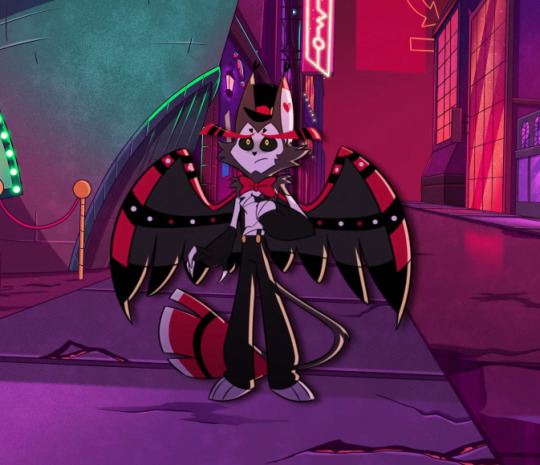

You can see Husk’s guilt and surprise in this scene. He knew Angel was putting on a front and correctly clocked that Angel uses his persona to cover his insecurity and to gain some feeling of control, but he made the assumption that Angel’s fake and self-sabotaging behaviors were not things that Angel was actively self-aware about.
Angel is extremely self-aware about his own situation. He knows exactly what he’s doing; it’s a calculated recklessness. This is one of the biggest reasons why Husk wasn’t made to be a mentor figure for Angel. Both of them can identify the issues in their lives, and both of them don’t know how to go about fixing it.
Husk and Angel as Parallels
Husk and Angel both know they're engaging in self-destructive behavior, and they both know why they do so. Husk and Angel are both under the control of someone who owns their soul. Husk and Angel are parallels and this is the purpose of “Loser, Baby” and the scene leading up to it. The point of the song isn’t for Angel to realize that he’s in a rough situation, the point is for him to realize that he’s not alone.

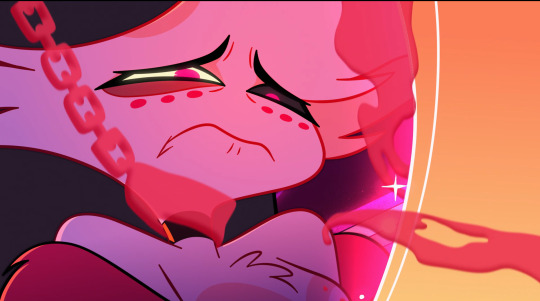
Their friendship is based on them seeing each other as equals, which is part of why I enjoy them so much. Charlie is Angel’s mentor, Husk is his confidant.
I think it’s pretty clear that Husk and Angel will be going in a romantic direction in season 2 which I'm excited for. I do think they’re endgame, but I’m not against a platonic outcome for them. There are a lot of ways it could work.
My main point is that they help each other, rather than Husk only helping Angel. They both gained a friendship and a shoulder to lean on from someone who understands.
youtube
"I just got used to you guys... I ain't finding no new drinking buddies"
(7:04-7:09)
#hazbin hotel#hazbin#hazbin angel dust#angel dust#angel dust hazbin hotel#hazbin hotel husk#hazbin husk#husk#huskerdust#character analysis#Youtube
35 notes
·
View notes
Note
Outside of Elijah/Klaus (cause there was absolutely 0 reason both of them died), which character in all of TVDU do you think had the most unnecessary/dumb death?
Honestly Klaus and Elijah aren't even in my top. Yes, both of them dying was dumb, but there are so many other death's that were more unnecessary. At least Elijah and Klaus made it to the end of TO.
Some honorable mentions: Hayley, Tyler, Gia, Josh, Enzo, Jo, Lexi, Sophie, Eve, Jesse, Aaron, Aya, Jackson, all of the hybrids, Carol, Henry, Celeste (first time), Genevie (first time and kind of second time). I'm sure there are more.
But my most unnecessary/dumb death is Cami O'Connell.
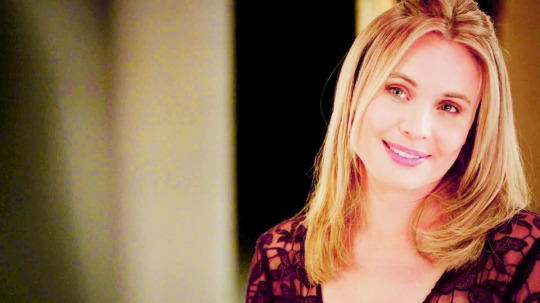
There was zero reason for her to die and it was because she wasn't meant to die. I firmly believe she was meant to be the school psychologist in Legacies. It would have made so much sense for her to be there for Hope after Hope lost so much of her family. It also would have allow a woman on the show to have a happy ending that wasn't centered around a man. Her happy ending would have been watching over Hope and helping all of the supernatural children, fulfilling her family's destiny.
Cami still had so much of a story left to tell. She was so young and full of promise. She lost her entire family due to the supernatural world and then was forced into it herself. If anyone in TO is a parallel to Elena, it is Cami. Her family legacy was so entrenched in the supernatural that it was only a matter of time before she herself was pulled into it.
Even her death made no sense. Lucien wanted to hurt Klaus for 'stealing' Aurora from him, but at that point, Lucien had the ability to kill Klaus. Sure, maybe he wanted him to suffer, so why not go after Hope? She was out in the bayou essentially unprotected (let's be honest, what could Mary have done?).
Even if we accept Lucien wanted to make it even by taking away Klaus' love, how did they not save her? Like two days later the entire Mikaelson gang is bitten and Freya just magically thinks of a way to freeze them and save them all? They couldn't have thought of that a little quicker? It's funny how they always manage to think of life saving magic when the plot/Mikaelsons require it, but there's no other options when it comes to sacrificing other characters.
Even if we accept that she died, they really didn't even make an effort to bring her back? Davina was able to be brought back from the dead after her soul was shredded. I know the other side was gone at that point, but let's not pretend the show didn't just bring back characters with very little rhyme or reason. The Mikaelsons didn't even attempt to find a way to bring her back.
And no one even say it was to help Klaus' character development. I hate when women are killed to further a man's development. It was clear in the writing that Klaus still needed Cami for his development. He was just at the brink of trying to be a better person, he was nowhere near done. We can clearly see this in the amount of scenes Hayley becomes ooc in order to be Cami for Klaus. Or Caroline coming in season 5, which made no sense, was clearly meant to be Cami.
Cami was an O'Connell and this meant something in New Orleans. People who claim her character was just a love interest were not watching. Her character was going to unite New Orleans. Not Hayley, not Hope, and definitely not the Mikaelsons. Every faction adored her. Marcel and Vincent loved her and would have done anything to keep her safe. The Mikaelsons each loved her outside of her relationship with Klaus. She would have always been a mother figure to Hope, no matter what her relationship was. Hayley loved her as well. We don't see her interact with the wolves too much but that's because they were largely forgotten in the writing. But every faction loved her and respected her. Her legacy was fixing the war in New Orleans. Which I love the writers just kind of dropped and everything magically go better when the Mikaelsons left, even though the war had been going on longer than the Mikaelsons were there.
The writers had not planned to kill her off but because of the toxicity of the fandom, they killed her off. This is just bad writing. They writers often cared more about ratings than the actual art of story telling and the show suffered because of it.
Thanks for the ask! What other deaths do you all think were unnecessary?
#cami deserved so much better#i didn't even need klamille to be endgame#she just didn't deserve to die#especially in that way#the scene where she was trying to be brave breaks my heart#she is one of the all time best characters in tvdu#argue with a wall#tvdu#the originals#the vampire diaries#tvd#the mikaelsons#klaus mikaelson#klamille#anon ask#fandom asks#tvd anon ask#tvd ask#anonymous#fandom answers#tvdu metas#metas
49 notes
·
View notes